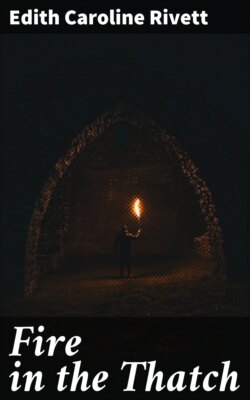Читать книгу Fire in the Thatch - Edith Caroline Rivett - Страница 4
На сайте Литреса книга снята с продажи.
1
ОглавлениеTable of Contents
Colonel St Cyres stepped out of the French window on to the terrace and drew in a deep breath of frosty air, conscious of the exhilaration of a glorious December morning. He always felt better out of doors. In the open air the worries and irritations of life seemed less immediate, and he felt that he lost a burden when he closed the window behind him.
The prospect before him was one to give a sense of wellbeing to any healthy man, and St Cyres, still in his early sixties, was vigorous enough to enjoy the keen still air and the glory of winter sunshine. Beyond the low wall of the terrace the frost-rimed meadows gleamed and sparkled, sloping down to the river a couple of hundred yards below. On the farther bank the land rose again in a series of gentle ridges, meadow land, plough land, and finally wood land in the distance. Here and there a thatched roof seemed to be tucked into the comfortable folds of the rich Devon valley, and blue wood smoke coiled into the still cold air. Everything was agleam with hoar frost, scintillating in the level rays of a sun which threw shafts of intense light along the valley and made the swift-running river flash back the white beams.
Down by the river some bullocks grazed in the lush grasses which never fail in a Devon pasture. Colonel St Cyres chuckled as a couple of the lusty young beasts horned one another around the pasture—Red Devons, the famous Ruby beef cattle, snorting and blowing in their youthful vigour.
St Cyres thrust some letters into the pocket of his old tweed coat and hastened along the terrace towards the corner where a cluster of outbuildings stood against a larch coppice. In his other hand was a good crust of bread and he munched it appreciatively though with a shamefaced grin. He had done a bolt, he admitted it frankly; he had brought his breakfast to finish out of doors or in the wood-shed, and he knew just why he had done it.
“God knows why he married her, poor chap—but scent at breakfast is more than I can stomach,” he said to himself.
The “poor chap” of whom the Colonel was thinking was his son, Denis, now a prisoner of war in Japanese hands. Whether the Colonel’s epithet was due to Denis’s plight or to the wife he had married was uncertain, but Colonel St Cyres disliked his daughter-in-law as heartily as any well-bred man allowed himself to dislike a woman. The Colonel was a countryman. He loved the country and his own ancestral acres with an unquestioning tacit devotion. He liked country clothes and country ways, the smell of dung, the rich red Devon mud, the slow slurred speech of his humble country neighbours and the inconveniences of an ancient house set miles away from trains or bus routes.
June St Cyres was a Londoner. She had been born in a flat in Mayfair, and a flat in Mayfair was her ideal of happiness. She liked fashionable clothes and shoes, French cooking, modern dance music, and what she called Society. She used elaborate make-up, vivid nail varnish, and Coty perfumes. When Denis had been reported as prisoner of war six months ago, Colonel St Cyres had gone up to London to see his daughter-in-law.
“Come down to us, my dear,” he had said, “and bring the little chap with you. It’ll be better for both of you, and we’ll look after you and save you any worries and troubles we can.”
Full of kindliness and sympathy, St Cyres persuaded June to give up her flat in town and to come with her small boy to live at Manor Thatch.
June had acquiesced at first. She was lonely and frightened and in debt. June St Cyres was one of those young women who can never live within their incomes, but she was shrewd enough to know that she could live at the Manor without paying anything for her upkeep. Also, she could not get a nurse for small Michael in town, or any domestic help in the flat, and she was very tired of “the damned chores” as she expressed it. At Manor Thatch there were some old servants—and Anne could help with Michael. Anne was Denis’s sister, a sensible domesticated creature of thirty—though June always regarded her sister-in-law as a woman of fifty. Anne was a sober, quiet woman, who lived contentedly in the same tweed suit year after year.
June came down to the Manor, bringing five-year-old Michael and a mountain of luggage. She had been there for six months, and it was difficult to say who disliked the arrangement most—June or her father-in-law. Chivalry and a sense of duty prevented Colonel St Cyres from suggesting any other arrangement. With June, it was sheer inertia which kept her at Manor Thatch, coupled to money difficulties. She wanted to go back to London, but the rents asked for any habitation which she called “possible” appalled her. Everything was expensive, and service was unobtainable. Two or three visits to town, staying at the Dorchester, had not assisted her laudable intentions of paying her debts. Bored, grumbling, and discontented, June St Cyres continued to stay at Manor Thatch. Irritated, hurt, but never complaining, her father-in-law tried to keep the peace and to put up with June’s untidiness and laziness, her habit of keeping the wireless on all day, and her total lack of consideration for anyone but herself.
